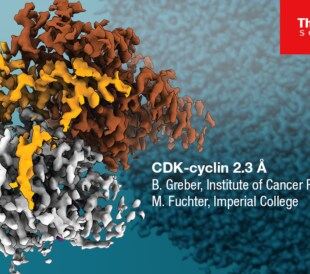Optimize your European Research Council grant application with advice from grant recipients
Often, cutting-edge research necessitates outside funding; luckily, many grant opportunities are available to researchers throughout their careers, from brand new labs to established groups. For this blog post, we focused on the numerous prestigious awards available from the European Research Council, which currently operates on a budget of 16 billion Euros from 2021 through 2027.
Applying for one of these coveted ERC research grants may seem like quite an undertaking. That’s why we asked two previous grant recipients, Professors Florian Schur and Meytal Landau, to share their experiences, specifically with the ERC Starting Grant and the ERC Consolidator Grant. Here, they offer their top tips for navigating the grant process so that you too can score the funding you need for your groundbreaking work.
- Professor Meytal Landau
- Assistant Professor Florian Schur
Watch the full discussion available now on-demand >>
Tips for preparing an ERC grant application
- Start early and plan thoroughly
The most important aspect of a successful ERC grant proposal is, perhaps unsurprisingly, planning.
Assistant Professor Schur took nearly a year to refine his grant application and emphasized the impact of thorough preparation and planning on his proposal.
Professor Landau also noted that planning includes optimizing the right timing for submission. Unless at the last eligible year, sometimes it is better to wait if relevant publications are expected and writing can be improved significantly.
- Focus – the importance of a clear and compelling narrative
The easier it is to understand the motivation of your work, the more likely it will spark the interest and intellectual curiosity of the reviewers. A clear and compelling narrative communicates the significance, innovation, and feasibility of your research, which greatly enhances the overall clarity of the proposal.
“You will need to show that you are the correct applicant for this type of proposal, that you have the expertise, and [that you have] the knowledge in order to pull off what you’re presenting. So, in the end that’s what will matter most,” said Schur.
A key part of a structured narrative is focus; tailor the proposal to meet the criteria of the ERC grant you’re applying for. They will want to fund exciting goals with unique systems or methods used. Write a proposal that convinces (first yourself) that the project is one of a kind.
- Seek feedback and refine your ERC grant proposal
A great way to refine and focus your grant application is peer review. Schur stressed the necessity of honest feedback, particularly from colleagues who might not be specialists in your field. This helps ensure that the narrative is clear and understandable. Beyond this, networking with previous ERC grant recipients and attending webinars and workshops can provide an invaluable peek behind the curtain and offer additional insights for crafting a successful proposal.
- Showcase preliminary data, your research track record, and institutional support
It’s important that your research environment fosters your project’s ambitions; a solid track record shows that you can obtain actionable and publishable results in support of your proposal.
“Whether you show preliminary data within your application or an already available publication, that will very much depend on also what kind of panel you have, how they value it. But that’s definitely an advantage,” said Schur.

Professor Schur’s notes, while conceptualizing his successful ERC grant application.
Similarly, aligning the grant application with key publications or career milestones clearly illustrates your strength as a researcher.
Finally, showing that you have your institution’s backing will paint a picture of a constructive research environment that will support your work.
- Consider your technology and equipment needs
Understand the practical requirements of your research, such as instrumentation and software. This can be particularly important in the life sciences, where necessary tools may be split between your lab, department, institution, etc. Consider your available resources and what would still be needed, including specific equipment and facilities. Regarding collaborations, Schur remarked on the need for nuance;
“Collaborations are positive … but what needs to be absolutely clear is that your project can be successful even without [them]. I think probably one of the worst things is to make it appear as if you’re dependent on somebody more senior, for example, to achieve what you’re proposing.”
- Understand the review process
ERC grants go through a series of reviews that narrow down the proposals until recipients are chosen. While you shouldn’t despair if you are knocked out during one of these rounds, it’s important to understand the implications. For instance, you are often blocked from applying again for a year following an initial rejection. Understanding the review process, including possible outcomes, is crucial and highlights the importance of planning.
- Be prepared for detailed questions, even on non-scientific aspects
While you may already be prepared to answer any question about the science of your proposal, it’s equally important to know the logistics of your project. This includes the finer details of your budget, project management, etc. As exciting as your work may be, interviewers want to be sure that you’re ready to lead the day-to-day aspects of your lab, and that the grant will be used efficiently. As Schur described;
“For the ERC interview, you really have to be prepared for detailed questions where people ask you about budget. They asked me about details about how am I going to spend money for publishing costs? How many papers will I publish? How do I recruit people? And so on and so forth.”
- Be resilient and adapt in the face of rejection
Landau described her journey through multiple applications and rejections before finally securing an ERC research grant in 2023. Her persistence highlights the importance of resilience in the grant application process. It’s vital to adapt in the face of rejection; take the feedback received during the review process and use it as the foundation for your next proposal. Seek additional peer feedback and meet the research landscape as it changes over time.
Learn more about the European Research Council grant application process
We hope these tips provide a practical starting point for optimizing your ERC grant proposal. To learn more about the European Research Council grants, watch our “Understanding the ERC Grant” webinar on-demand, and visit our Funding and Grants page for further help and guidance with your funding journey.
About the grant recipients
– Florian Schur, PhD – Institute of Science and Technology Austria
Professor Schur is an assistant professor at the Institute of Science and Technology Austria. His group studies the structural biology of cell migration and viral infection. He received an ERC Starting Grant in 2022 to investigate the actin cytoskeleton.
– Meytal Landau, PhD – Israel Institute of Technology
Professor Landau is an associate professor at the Technion – Israel Institute of Technology. Her research focuses on amyloid proteins, which are associated with a number of neurodegenerative and infectious diseases. She received an ERC Consolidator Grant in 2023 to investigate how amyloid structure could support the development of novel antimicrobials.







Leave a Reply